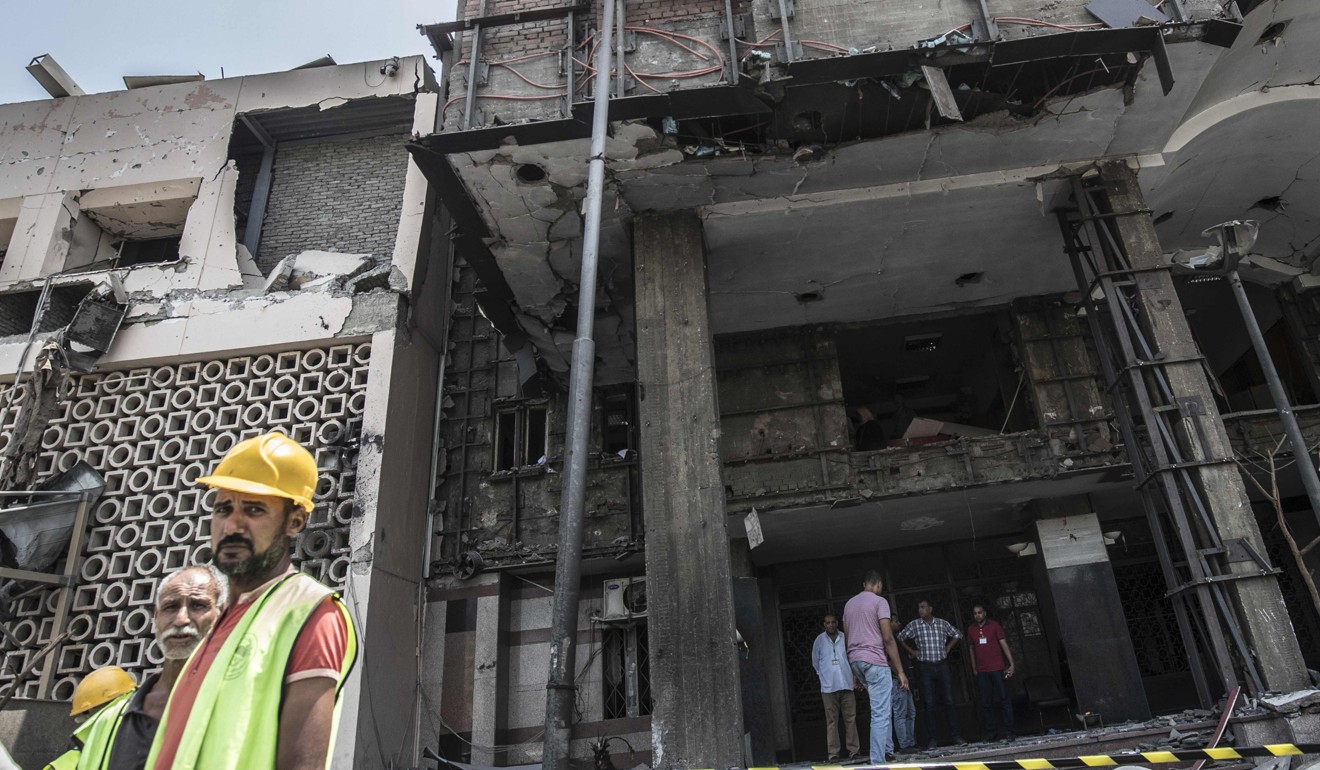
At least 20 dead and 47 injured in ‘terrorist’ blast outside hospital in Egypt’s capital
- The blast struck around midnight, on a road running along the Nile river in an area outside Egypt’s National Cancer Institute
- The country’s interior ministry had sought to quell suspicions that it was a terrorist incident, but later said the car involved contained explosives
The blast struck around midnight, on a road running along the Nile river in an area outside Egypt’s National Cancer Institute. Pictures of the scene published by Egypt’s largest newspaper Al-Ahram taken just after the incident showed two burnt-out cars, at least one completely blackened and dented from the force of the explosion.
“I was waiting to use a bathroom inside the hospital around 12.30am when I heard a big explosion,” said Nermat al-Awady, who had travelled to the cancer centre from Minya so her child could receive treatment.
Awady had intended to sleep outside the hospital with her child before queuing for treatment the following morning. “We ran to the main entrance of the hospital but it was on fire, so we left through another side door,” she said.
“I saw body parts and lots of blood,” she said, adding that she believed the fire had burned for an hour. “Inside the hospital, there was panic. Women and children were screaming and running. The hospital stairs are normally crammed with people, so it was hard to escape.”
Egypt’s ministry of health said it dispatched 42 ambulances to the blast site to attend to the wounded, with injuries ranging from burns and cuts while four remained in intensive care.
Some 45 patients were evacuated to other hospitals. A ministry spokesman said they had recorded 19 deaths as well as “a bag of body parts”. Cairo police said they were combing the Nile for additional victims who may have fallen after the blast.
At the site the next morning, the force of the blast was clear to see, as police and security officials watched over patients accessing the National Cancer Institute. Twisted metal, possibly from the bumper of a car, hung from the damaged front facade of the building as shards of broken glass and tiles covered the surrounding pavement.

The explosion tore letters from the institute’s sign, and warped a bare metal frame that stood outside the building. Egypt’s ministry of interior sought to quell suspicions that the explosion was a terrorist incident in a statement issued around 1am on Monday.
The ministry blamed the explosion on a “car speeding into oncoming traffic” on the Nile corniche, stating that the car collided with three others causing the blast.
However, later on Monday the ministry issued a new statement saying that the car involved in the blast had contained explosives and was to be used in a “terrorist operation”.
The ministry routinely issues updates via its Facebook page, where many Egyptians left comments expressing their doubts about the initial official version of events.
“By god, shame on you for treating us this way and telling us this was an accident due to a car driving in the opposite direction,” said one commenter.

In a post on his official Facebook and Twitter feeds on Monday, Egyptian president Abdel Fatah al-Sisi called the explosion a “terrorist incident”.
“I extend my deepest condolences to the Egyptian people and the families of the martyrs killed in the cowardly terrorist incident,” the post read.
Egypt has been hit by a number of blasts in recent times.
A parked car exploded in the central Dokki neighbourhood of Cairo last August, injuring at least three people. Egyptian officials speculated that a faulty car battery sparked the explosion, causing a fire that damaged a nearby minibus.
A series of violent explosions shook the Egyptian capital in 2015, including a car bomb which destroyed part of the Italian consulate adjoining Cairo’s Tahrir Square and a blast targeting a security building in the Shubra al-Khaima neighbourhood in the north of the city.
Roadside bomb injures tourists on bus near Egypt’s famed pyramids
In 2014, four blasts occurring in one evening killed six people and injured 80 in downtown Cairo in a string of attacks targeting police.
Islamist militants have systematically targeted police and security institutions since the violent overthrow of the former president, Mohammed Mursi in 2013, including a car bomb which struck the motorcade of former top prosecutor Hisham Barakat, one of the highest profile assassinations in the country’s history.
Al-Sisi, the president, launched what he promised would be a comprehensive operation to “clear Egypt’s territory of terrorist elements,” in February 2018, focused on the restive northern Sinai peninsula, Egypt’s western desert and Nile Delta. The operation began two months after gunmen and explosions targeted a mosque in northern Sinai, killing 305 people.
Additional reporting by Agence France-Presse

